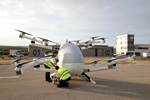Horizon’s Cavorite eVTOL prototype completes initial hover testing
Reports confirm the aircraft is extremely stable, is capable of full hover at only 65% power and has hovered with 20% of its fans purposely disabled.

Cavorite scale prototype. Photo Credit: Horizon Aircraft
According to several sources, (Toronto, Ont., Canada) has successfully completed initial hover testing of its half-scale Cavorite X5 electric vehicle takeoff and landing (eVTOL) prototype. According to Airframer.com, the company plans to move to transition flight testing in Q1 2023 to the ACE Climatic Wind Tunnel located near Toronto, Ontario.
The 15-foot-long aircraft, confirmed by CW to use composites, features a 22-foot wingspan. It is capable of speeds over 250 kilometers per hour, a 310-mile range and a five-passenger capacity. According to , Cavorite’s design enables it to fly in a low-drag configuration and is safer, more efficient and easier to certify than “radical” new eVTOL designs.
Brandon Robinson, CEO, Horizon, notes that the “aircraft has exceeded expectations during initial hover testing. It is extremely stable, is capable of full hover at only 65% power and has hovered with 20% of its fans purposely disabled in order to test system redundancy ... It continues to yield valuable data that is constantly improving our full-scale design.”
In addition to its work with Cavorite, Horizon is part of a U.S. Air Force competition, AFWERX HSVTOL, to develop a concept for a high-speed VTOL aircraft.
Related Content
-
Lilium launches M&A process, targets eVTOL program continuation
Despite court-approved insolvency filings and beginning first investor briefings, Lilium remains fully focused on re-emerging following restructuring, setting its sights on fresh investment to support the Lilium Jet.
-
Beta begins Alia CTOL production aircraft flight testing
Flight of first production aircraft fresh off Beta’s full-scale manufacturing line in Vermont is followed by Special Airworthiness certification from the FAA.
-
Joby conducts FAA testing, moves into final certification
Successful static loading testing of tail structure and Type Inspection Authorization by FAA pilots moves Joby closer to its 2025 targets.



